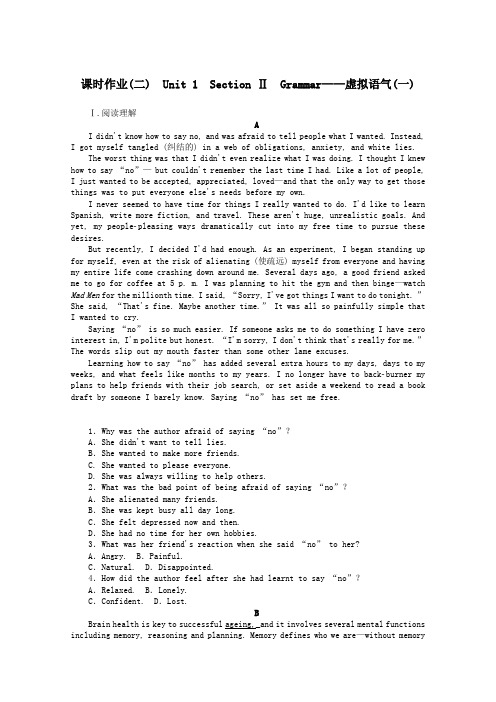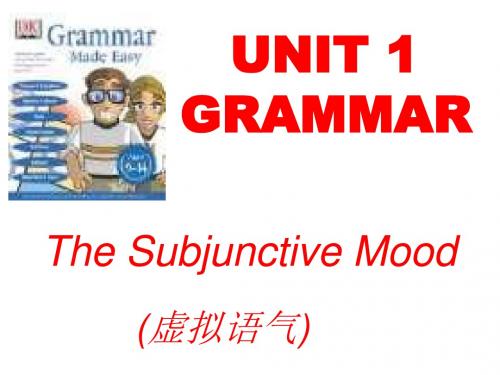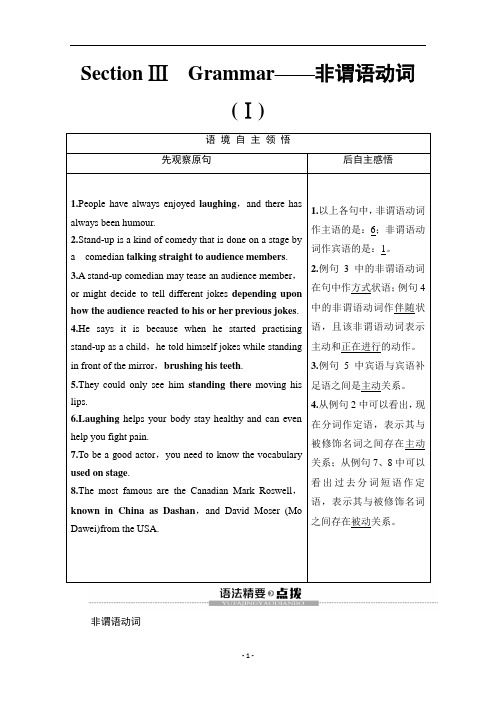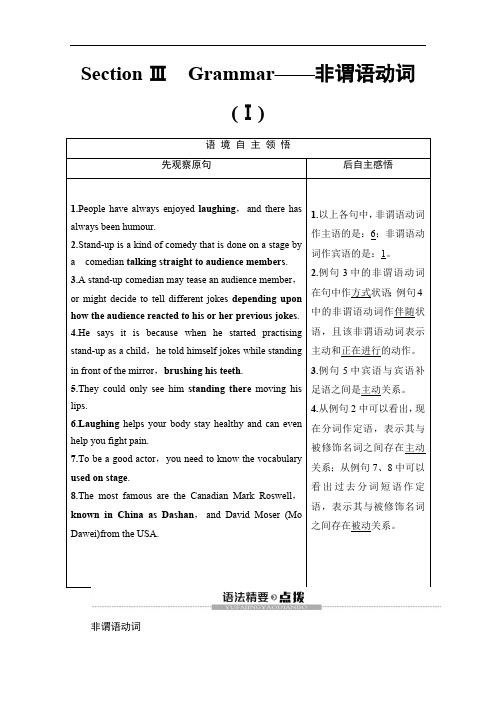学英语报选修6unit1 Grammar
- 格式:ppt
- 大小:9.77 MB
- 文档页数:53

课时作业(二) Unit 1 Section ⅡGrammar——虚拟语气(一)Ⅰ.阅读理解AI didn't know how to say no, and was afraid to tell people what I wanted. Instead, I got myself tangled (纠结的) in a web of obligations, anxiety, and white lies.The worst thing was that I didn't even realize what I was doing. I thought I knew how to say “no”— but couldn't remember the last time I had. Like a lot of people, I just wanted to be accepted, appreciated, loved—and that the only way to get those things was to put everyone else's needs before my own.I never seemed to have time for things I really wanted to do. I'd like to learn Spanish, write more fiction, and travel. These aren't huge, unrealistic goals. And yet, my peoplepleasing ways dramatically cut into my free time to pursue these desires.But recently, I decided I'd had enough. As an experiment, I began standing up for myself, even at the risk of alienating (使疏远) myself from everyone and having my entire life come crashing down around me. Several days ago, a good friend asked me to go for coffee at 5 p. m. I was planning to hit the gym and then binge—watch Mad Men for the millionth time. I said, “Sorry, I've got things I want to do tonight. ” She said, “That's fine. Maybe another time.” It was all so painfully simple that I wanted to cry.Sayi ng “no” is so much easier. If someone asks me to do something I have zero interest in, I'm polite but honest. “I'm sorry, I don't think that's really for me.” The words slip out my mouth faster than some other lame excuses.Learning how to say “no” has add ed several extra hours to my days, days to my weeks, and what feels like months to my years. I no longer have to backburner my plans to help friends with their job search, or set aside a weekend to read a book draft by someone I barely know. Saying “no” h as set me free.1.Why was the author afraid of saying “no”?A.She didn't want to tell lies.B.She wanted to make more friends.C. She wanted to please everyone.D. She was always willing to help others.2.What was the bad point of being afraid of saying “no”?A.She alienated many friends.B.She was kept busy all day long.C.She felt depressed now and then.D.She had no time for her own hobbies.3.What was her friend's reaction when she said “no” to her?A.Angry. B.Painful.C.Natural. D.Disappointed.4.How did the author f eel after she had learnt to say “no”?A.Relaxed. B.Lonely.C.Confident. D.Lost.BBrain health is key to successful ageing,_and it involves several mental functions including memory, reasoning and planning. Memory defines who we are—without memorywe have no past, cannot plan for the future and are unable to enjoy the present. Our reasoning and planning skills help us create and maintain healthy lifestyle habits that protect our bodies and minds.People are living much longer than ever before. Those born in 1900 would have been lucky to reach their 50th birthday. Today, life expectancy in many countries exceeds 80, but unfortunately agerelated diseases such as Alzheimer's and diabetes can diminish quality of life.As we age, brain cells that normally fight off infection and repair tissue begin to attack healthy brain cells. This causes inflammation (炎症) and can lead to cognitive deficits and disease. But adopting healthy lifestyle habits, such as eating fish, getting a good night's sleep and doing physical exercise, can slow and even reverse the process.The typical 45yearold has worse memory than the 25yearold, and our brains will continue to decline if we do nothing to protect them. However, if we intervene (干预)early, we can slow the decline. It's always easier to protect a healthy brain than to try to repair damage once it is extensive.Although there is a genetic component to healthy ageing, lifestyle habits may be more critical than genes. The landmark MacArthur Studies of Successful Ageing showed t hat, on average, nongenetic factors are more important than genetics in determining how well and long we live, suggesting that we have more control than we realize over remaining healthy as we get older.5.What does the underlined word “ageing” mean in the first paragraph?A.The process of getting old.B.Mental functions.C.Life expectancy.D.Healthy lifestyle.6.What can we do to slow the decline of our brains?A.Enjoying the present.B.Staying in a good mood.C.Working as long as possible.D.Adopting healthy lifestyle habits.7.What does MacArthur Studies of Successful Ageing suggest?A.Agerelated diseases affect our quality of life.B.Genetic factors determine how well we live.C.We can do something to live better and longer.D.Sometimes we don't know how to keep healthy.8.What is the main idea of the text?A.Daily habits determine your longevity.B.You should protect your brains early.C.Good health results from right food.D.Body exercise also benefits mental health.Ⅱ.完形填空Cathy and I met a few days after I first arrived in China. I was walking around the English academy which had __1__ me, introducing myself to my new colleagues, most of __2__ were Chinese. I entered Cathy's __3__, saw her, and immediately felt some __4__ and happy emotions (情感). She __5__ so kind, yet professional. I couldn't stop smiling like a (n) __6__. After introducing ourselves and exchanging __7__ questions.I asked whether she knew anyone who could __8__ me in Chinese. She said she could, and agreed to meet outside work.We sometimes exchanged nonromantic texts in the evening. After a couple __9__,I invited her to my apartment. I was very nervous. Later, I asked if she would consider __10__ me. She didn't immediately __11__, but said she would tell me the next day.I found it very difficult to __12__, but I did.This was a __13__ difference. In American culture, starting to date someone is not a big, important __14__, but I think in Chinese culture it is. Well, she said “yes”, and so we spent lots of time together, and __15__ love. I asked her to __16__ me about 6 or 7 months later.We had a Chinese style __17__ in Cathy's hometown. My parents came, and it was great. It went really __18__. Everyone was very __19__. It was a very fun and interesting __20__ for me, very different from a Western style wedding.1.A.hired B.firedC.educated D.hated2.A.which B.themC.whom D.what3.A.life B.classroomC.bedroom D.heart4.A.interesting B.awkwardC.disappointed D.looked5.A.talked B.taughtC.smelled D.looked6.A.father B.actorC.fool D.genius7.A.basic B.seriousC.practical D.strange8.A.match B.persuadeC.communicate D.tutor9.A.hours B.weeksC.years D.decades10.A.dating B.teachingC.cheering D.praising11.A.leave B.argueC.agree D.answer12.A.sleep B.laughC.wait D.complain13.A.temporary B.nationalC.cultural D.political14.A.risk B.decisionC.trouble D.fault15.A.traded B.fell inC.talked about D.broke in16.A.marry B.wait forC.test D.go with17.A.breakup B.partyC.gettogether D.wedding18.A.steady B.wellC.annoying D.fast19.A.curious B.politeC.sad D.happy20.panion B.lessonC.experience D.story课时作业(二)Ⅰ.阅读理解A【语篇解读】本文是一篇记叙文。




Section ⅢGrammar——非谓语动词(Ⅰ)语境自主领悟先观察原句后自主感悟1.People have always enjoyed laughing,and there has always been humour.2.Stand-up is a kind of comedy that is done on a stage bya comedian talking straight to audience members.3.A stand-up comedian may tease an audience member,or might decide to tell different jokes depending upon how the audience reacted to his or her previous jokes.4.He says it is because when he started practising stand-up as a child,he told himself jokes while standing in front of the mirror,brushing his teeth.5.They could only see him standing there moving his lips.ughing helps your body stay healthy and can even help you fight pain.7.To be a good actor,you need to know the vocabulary used on stage.8.The most famous are the Canadian Mark Roswell,known in China as Dashan,and David Moser (Mo Dawei)from the USA. 1.以上各句中,非谓语动词作主语的是:6;非谓语动词作宾语的是:1。

Section Ⅲ Grammar——非谓语动词(Ⅰ)语境 自 主 领 悟先观察原句后自主感悟1.People have always enjoyed laughing ,and there hasalways been humour.2.Standup is a kind of comedy that is done on a stage bya comedian talking straight to audience members .3.A standup comedian may tease an audience member ,or might decide to tell different jokes depending uponhow the audience reacted to his or her previous jokes .4.He says it is because when he started practising standup as a child ,he told himself jokes while standing in front of the mirror ,brushing his teeth .5.They could only see him standing there moving his lips.ughing helps your body stay healthy and can evenhelp you fight pain.7.To be a good actor ,you need to know the vocabularyused on stage .8.The most famous are the Canadian Mark Roswell ,known in China as Dashan ,and David Moser (MoDawei)from the USA. 1.以上各句中,非谓语动词作主语的是:6;非谓语动词作宾语的是:1。
Unit 1 Art1.3 Grammar & WritingGrammar: 虚拟语气(Ⅰ)(Subjunctive Mood (Ⅰ))一、语气的分类语气是动词的一种形式,表示说话人对某一行为或事情的看法或态度。
英语中的语气分为陈述语气、祈使语气和虚拟语气三类。
1.陈述语气表示动作或状态是现实的、确定的或符合事实的,用于陈述句、疑问句和某些感叹句。
☛There are two sides to every question.每个问题都有两面性。
2.祈使语气表示说话人对对方的请求或命令。
☛Please lend me your dictionary.请把你的字典借给我用一下。
3.虚拟语气用来表示所说的不是事实,或者是不可能发生的情况,而是一种假设、愿望或建议等。
虚拟语气通过谓语动词的特殊形式来表示。
☛If I were a bird,I could fly in the air.如果我是一只小鸟,我就能在空中飞行。
二、虚拟语气在条件句中的应用包含条件从句的句子称为条件句。
条件句分为两类:一类是真实条件句,一类是虚拟条件句。
如果假设的情况很可能发生,就用真实条件句。
☛If he has time, he wil come. 如果他有时间,他会来的。
☛He won’t succeed unless we plan well. 他不会成功的,除非我们计划好。
如果假设的情况发生的可能性不大,则用虚拟条件句。
虚拟条件句分为三种,见下表:假设情况条件从句的谓语形式主句的谓语形式与现在事实相反过去式(be的过去式常用were)would/should/might/could + 动词原形与将来事实相反(1) 过去式(2)should + 动词原形would/should/might/could + 动词原形(3)were to + 动词原形与过去事实相反过去完成时(had + 过去分词)would/should/might/could + 过去分词☛If he had time now,he would(could,might)go with you.要是他现在有时间,他会和你一起去的。
高二英语Unit 1 Grammar 虚拟语气知识精讲新人教版选修6一、学习目标:1. 学习虚拟语气在条件句中的应用。
2. 掌握虚拟语气使用的语境与方法。
二、重点、难点:虚拟语气在条件句中的句型结构。
三、考情分析:在高考题中,目前全国19套各地市试题中涉与到虚拟语气知识点的占30%以上,因此这一语法项目在高考中变得越来越重要。
这一知识点经常以单项选择题的形式出现,分值为1分。
而且,我们在日常对话中也会经常用到虚拟语气。
四、知能提升〔一〕知识讲解【认知讲解】教材原句呈现①If you were an artist, what kind of pictures would you paint?②If the rules of perspective had not been discovered, no one would have been able to paint such realistic pictures.③Have you ever wished you could paint as well as a professional artist?比照分析第一个句子中的从句显然是做了一个不可能成立的假设,这是一个与现在事实相反的虚拟语气的句子。
第二个句子中如此是与过去事实相反,是表示如果透视法没有被发现,就没有人能够画出这样具有现实主义的画来。
第三个句子中wish后面的虚拟语气,表示与将来事实相反。
【重、难点】1〕虚拟语气可以用来表示说话人的主观愿望或假想,所说的是一个条件,不一定是事实,或与事实相反。
虚拟语气在条件句中应用得比拟多。
2〕条件句可分为两类,一类为真实条件句,一类为非真实条件句。
非真实条件句表示的是假设的或实际发生的可能性不大的情况,故采用虚拟语气。
I.真实条件句用于陈述语气,所假设的情况有可能发生。
结构如下所示:从句往往用一般现在时,而主句如此由“shall/will + 动词原形〞构成。